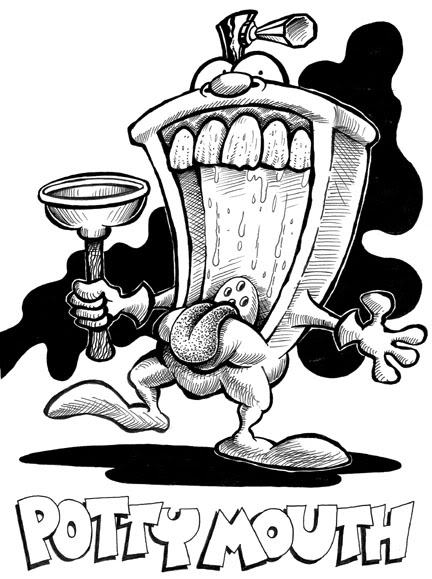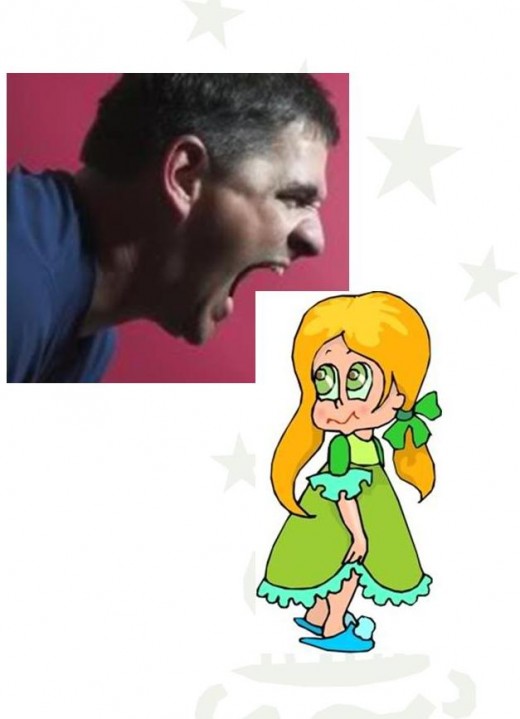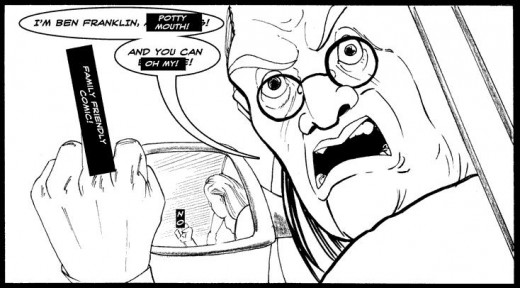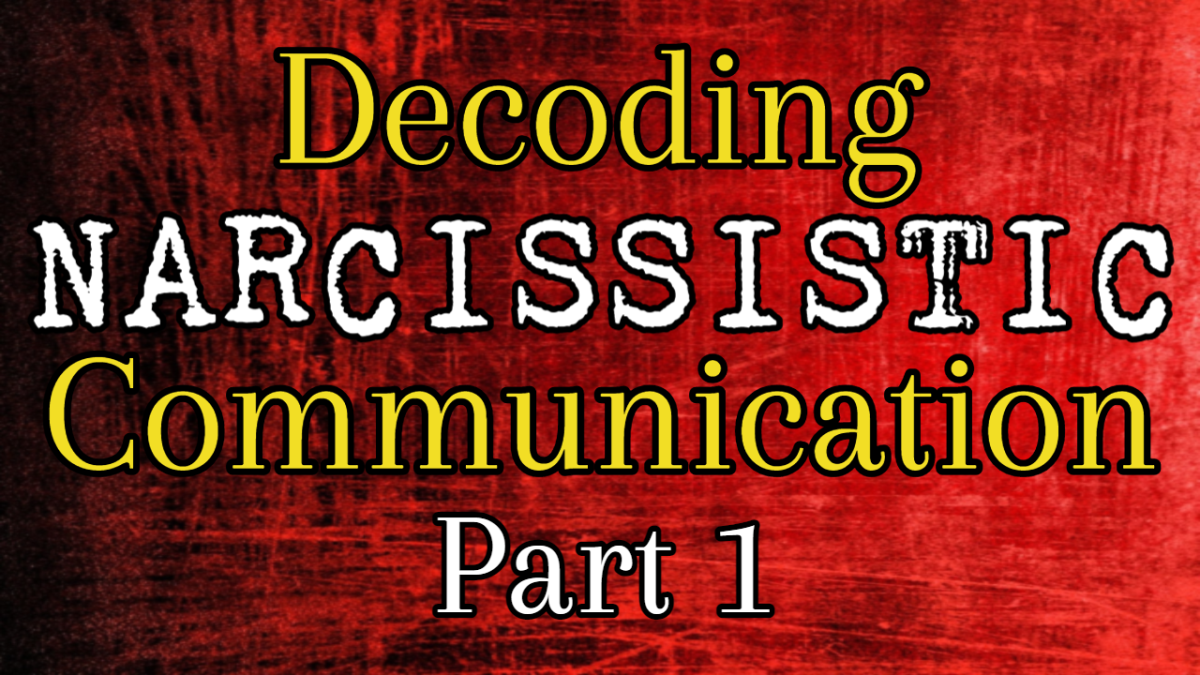Cursing vs. praising: which one you do most often reveals a lot about your personality and the culture you live in
A recent study of 276 people on Facebook found that swearing was associated with authenticity and honesty
The hypothesis is that people who swear do not filter their language and people who are careful about what they say are covering up their true selves and so not being honest or authentic. We would like to argue differently; that people who don't swear out loud or privately are not less authentic but instead are being respectful and aware of the negative impact of illicit speech.

Colorful language
"Suck it up buttercup," the female coach tells her struggling, near tears athlete who wants to take a break. "Retard," the older brother calls the younger one. "You make me so mad I want to choke you," says the mom to her teenage son who won't put his dirty clothes in the hamper.
We all use colorful language, especially when we are upset or trying to push through a difficult task we don't want to do or deal with difficult people who upset us. Multiple psychology studies show that using such language helps us to cope, motivate and adapt to situations that might be difficult to get through without a "pep talk" of explicit language, yet some words are considered worse than others, especially when they dehumanize others or intentionally are used to offend or attack.
To swear or not to swear, that is the question
Are swear words a part of your color pallet vocabulary? Do you splat them out like indecipherable portraits of your inner turmoil, angst ridden graffiti or grunge rock rants, and if so, is this really good for you? Certainly speaking your mind can help relieve stress to a degree, but is it appropriate to do so in all situations, public or private and should we put limits on derogatory words and phrases that some find offensive or is it tough luck and your right to say what you mean however and whenever you want to say it?
Maybe you were raised by more traditional parents, or taught in churches or schools where language rules were pretty strict and any reference to sex, defecation, violent actions or making fun of others was strictly forbidden. You did not call someone a donkey face or substitute frickin' for its ruder cousin that sounds like a duck. "If it quacks like a duck," your caregivers said, "then it might as well be a duck, so don't use it..."
Who's right or is it just a matter of personal taste and cultural acceptance? Nowadays it is hard to pick up a magazine without reading how fucking awesome the sunrise over the canyon appeared or how a singer looked like shit in a leotard made for someone much younger.
The last time I checked, the sun was not a sexual being and clothing and humans were not composed of fecal matter. Whatever happened to words like amazingly gorgeous to describe nature or more polite words such as,age appropriate or unflattering to the figure to define someone's poor taste in clothing or lack thereof?
Is a polite and respectful society lost when the language becomes so colorful that it feels like being pelted by a paint ball gun? Is being authentic, necessarily needful of storming through life ignoring the damage one leaves in one's wake? Donald Trump's authentic slurry of words may show his true inner character, but is that really something to which we should aspire? Is putting a filter on the thoughts in our head really such a bad idea, especially when in the company of those who may not think and feel the same way we do about things?
Does colorful language have to be hurtful language and is it okay to use disparaging words around children and adults who have been taught that it is inappropriate and rude in polite company?

A 2012 Study on swearing around children yielded "inconclusive results", but felt it was the emotional content and not the words themselves that were harmful
We tend to discourage swearing around children, but a study in 2012 which looked at the increased use of taboo words in television and media and whether using curse words around children had harmful effects found inconclusive results. They did find that children under the age of 12 mostly did not understand the meaning of swear words and used them because those around them used them. They also found that if swear words were used abusively toward children that they were harmed by them, but no more so than if any demeaning words were used, such as stupid, dumb, ugly, moron, fat, etc.
Their bottom line on adult usage of swear words was that if they were used in normal conversation then they were not hurtful or harmful, but if negative emotions were associated with swearing then it could cause psychological harm. They also claimed that they had never known an incident where using swear words alone had erupted in violence, but that loss of temper was the cause of violence, not swearing.
If you have ever had someone curse and swear at you and shake their fist in the air, you might disagree with those findings. If someone smiles and waves at you and gives you a compliment you will have a near opposite reaction than if they swear at you, smile or no smile accompanying! It is hard to separate emotions from words with swear words still bearing a negative connotation and praise words yielding more positive responses. It would be logical to assume that swearing at someone would more likely yield negative emotional responses whereas praising someone without being false about it, would elicit a more positive reaction.
A 2016 study claims that people who curse are more authentic and honest than their non-cursing counterparts
A recent survey by the Social Research Council, at Lancaster University and Cambridge University Press revealed that women are using the F word more often than men do these days. Lead researcher Tony McEnery claims it to be linked to social equality, with women behaving and speaking more like men and less in a "lady-like" fashion.
The research was part of a broader study which has been published in Social Psychological and Personality Science. The authors concluded that those who cursed were more honest than those who didn't because they did not filter the words and thoughts in their head but delivered them as they occurred in a "genuine expression of emotions."
The authors of the study also measured the subjects level of honesty, propensity to blame others, cheating level on games and taking advantage of others and claimed that people who cursed tend to do less of the above than people who didn't.
Of course if participants were self reporting, they might lie to make themselves look good on the test, whereas someone who did not curse and really didn't lie about it, may have had a stronger 'guilty' conscious and so answered more honestly about whether they had ever cheated, blamed someone or lied. This is the problem with self reporting verses controlled tests where participants actions are measured, not their own accounts of their actions that are not observed.
The big news from this study now floating around the internet and getting front page attention in papers and morning news shows comes from the studies co-author in the United States, David Stillwell who stated about those who swear, "On the other hand, they are not filtering their language so they are probably also not putting their stories about what is going on through similar filters which might turn them into untruths."
He's basically stating that people who control their language are lying to make themselves look self righteous when they are really as guilty as anyone else. I take offense to that as well as to those who think swearing makes them jolly good people who say it like it is no matter who gets their feelings hurt.
The researchers then conducted a second study on Facebook polling 74,000 users and looked at the frequency of swear words compared to the use of first-person pronouns and anxiety driven words and found those who cursed appeared to have more personal anxiety and were more willing to share it in public.
Somehow they concluded that those who were not cursing and not reporting how awful their life was were then lying about it and trying to look cool and save face by not reporting any bad news about themselves or their family, sort of like those end of the year Christmas newsletters families used to mail out that made them look wonderful and may have made you feel like a loser because you or your family do not measure up: "Ron is now a senior in med school and won all star varsity, turning down a chance to play for the New York Giants and planning to work with Doctors without borders upon finishing his internship at the Mayo Clinic..."
We wonder if the researchers did not conclude that those not using curse words may not have had that much angst to report or might have decided that they did not want to burden others with their problems or share information that was not positive in nature... the very reason why most of us don't curse to begin with. We seek to praise and encourage not disparage and remove hope from those we love. We don't like it when we curse and we don't like it when others do it, because it sets up a negative, disrespectful tone that makes life more unpleasant than it needs to be.
In short, just because a survey says a lot of people that curse are more willing to share their personal lives and problems on Facebook is not a scientific study that "proves people who curse are more honest than those who don't"
While all of us say things we shouldn't that hurt others, keeping your thoughts and language clean and making an effort to be positive and upbeat is not a mark of a dishonest person trying to fool everyone into thinking they are better than everyone else!
Sure, if you don't filter your thoughts and spew out whatever is on your mind, you are going to be more truthful in that sense, but that is not necessarily something that is beneficial to you or those around you. If you don't want to offend someone, you don't necessarily have to lie to them or keep your opinions to yourself, but you can be tactful and think about the words you are going to say before you say them and this does not make you repressed or less of a good friend than someone who blurts out advice that may do more to harm you than to help you.
How often do you use praise language?
For many, the word praise is synonymous with praising God. We talk about singing the praises of a great product or person who has done something to greatly influence others in a positive manner. We tend to curse things that hurt us make life miserable.
Praises tend to be a reflection of happiness, humility, respect, gratitude and bring us hope when we don't feel the blessings of God upon us. The book of Psalms in the Bible is one big book of praise. Praise is sung when times are good and when times are bad. Praise focused outside of ones own ability and gave people hope and encouraged them to have faith, all conservative, traditional qualities made manifest in a belief in a higher power that had the good of man at heart, but in today's society, God or a belief in a higher power that created the world, is beginning to fade, with many people looking toward science and technology and putting aside the "ancient" beliefs in favor of freedom and equality for all, and this includes the freedom of speech and the free use of whatever words one wishes to use in whatever context or environment one wishes to use them.
Unfortunately, curse words are used most often when people are angry and hurt and often escalate to angry confrontation, false accusations, literal name calling and an unwillingness to cooperate with anyone who disagrees with anything you feel is your right to do without intervention.
Who is right and who is wrong, or are both sides equally valid?
Survey says...
A few years ago, I posted a survey on a forum of mostly women and a few men, ranging from age 14 to 70. there were just under 200 participants. I asked who used profanity and how often they used it. Nearly all, about 98 percent, said they used profanity or curse words at some point in their lives.
The survey also asked how often curse words were used. Younger survey takers, age 14-26 said they used curse words almost daily. Teens said they were more likely to use curse words when talking to their friends rather than around parents and teachers. When asked where they heard their first swear words, an alarming 85 percent said from their parents. Another ten percent said from outside the home through peers. The remaining said from television, in books, magazines or in a public setting from people unrelated to them.
When asked if they thought it was appropriate to use curse words in all environments, over 90 percent said no. Many felt using curse words around very young children, grandparents, religious people and professional settings was inappropriate. The older the survey taker was, the more likely they were to feel cursing was wrong in public, such as shopping centers, parks, theaters, etc. The younger the survey taker, the more likely they were to think not only that it was okay, but a positive way to share thoughts and feelings.
At the beginning of the survey participants were asked if cursing was good, bad or indifferent. Again, the answers changed based on age with most younger adults thinking it was good and just another form of expression. Middle aged adults felt it was okay, but said they would prefer to use less cursing and hear less of it in public, especially from kids, and older adults largely felt it was wrong and was demeaning and offensive and a reflection of a cruder society.
After asking several other questions, such as, "have you ever been offended when someone cursed at you," or "have you become more angry when you used cursed words?" The final question asked: "Do you use more curse words when you are angry and upset or when you are happy and at peace?" Ninetyeight percent (100 percent of those who claimed to curse) responded, "when I am more angry and upset." I rest my case... well, sort of anyway...there is still room for discussion.
Curse words are not something indigenous to the modern world
We tend to associate curse words with modern societies, but they have been around since people have learned how to talk and probably existed in the form of hand gestures before that. Shooting someone the bird is synonymous with the F word, which is often referred to as "dropping the bomb" because it used to make people gasp and turn red faced in embarrassment when it was used in public.
Now it is hard to go anywhere without hearing vile language that does little to inspire and encourage us to "love one another" as the Bible commands. How loving is it to shoot someone the bird and tell them to go burn in Hades for all eternity suffering eternal torture while people poop on them? Hmmm, hard pitch to convince me or anyone that this kind of language is authentic and good and the sign of a well rounded human being.
In ancient days, curses were designed to condemn our enemies not bring us closer together as friends. Voodoo dolls with pins stuck in them were not created as fuzzy play toys for children, they were designed to bring misery and suffering, even death, to those who made our lives less pleasant by their actions and in a sense that is how and why we use curse words today.
When something makes us mad, we curse or condemn it. By doing so, we hope to gain power over the offending thing and send it far away and in some ways that actually works. If you are having a conversation with someone and trying to get them to see things your way and they tell you to go F off, which could be pleasant if taken literally as a means of masturbation, you are most likely to get your feelings hurt and yell an equally or more astounding curse in their direction as you storm off in anger, which is exactly what the other person wanted.
If your loving son tells you that your only purpose should be to be mated like a dog and produce liters of pups and that you are equivalent to a pile of fecal matter, you are not going to respond by, "oh darling, I love you too. You are so precious and kind and loving, I just want to give up all my freedoms to provide a good life for you...."
The old phrase, "you can catch more flies with honey than with vinegar" is a good one to keep in mind when you feel like comparing your mom to a cow patty or suggest your brother should have sex with your mom because he won't loan you his new leather jacket after you ruined yours by being careless with it.
If you really stop to think about the meaning of the words you are saying, wouldn't you really rather be using uplifting, encouraging, thought provoking words of wisdom, rather than spewing out senseless phrases that make you look as if you were a cat that had its tail stepped on and is seeking revenge by doing as much to hurt as was done to them? Is that sort of authenticity something we could all do with less of in our lives or should we encourage more honesty and take it a step further and literally kick someone in the butt rather than think about doing it. Are we lying to ourselves if instead of cursing someone who is angry with us, we say, "i'm sorry I offended you," then walk away with our lying dishonest selves who are too repressive to hurl obscenities back at them like a normal, well acclimated F bomber?
Do you really understand the meaning of the words you use and the feelings they convey?
A few years ago i went on a kayak trip with a buddy from church. He had never cursed around me before and knew I did not like using curse words. It is a lot easier not to use curse words when you do not hear them. When I hung out with Christian friends who did not use bad language, I didn't either, but when I heard it on TV or movies or hung out with friends who constantly used four letter words without even thinking, I found myself using them in my head and fearing they would exit my mouth at the most inappropriate time.
We were walking along a deserted island beach when a strong wind blew, making it hard to stay upright and pelting us with sand. Then, like a bullet shot, a bumble bee slapped the side of my friend's face with such intensity that he shouted, "Shi...iiiii..oooot!", turning sheepishly in my direction and saying, "well, that was a close one." We both had a giggle about it. I would have fully understood if he slipped up and let one fly. The bee had not stung him, but it had ricocheted off his face with enough force to leave a red spot behind. Those are instances where a benign curse word may have warrant, but the majority of time, there are other, less offensive words that will equally suffice.
When working with the teens at church I tried to get them to imagine doing the words they just said. If they were compelled to say, "Oh s..." I asked them to imagine what would happen if they did exactly that and how appropriate that would be... just squat, take off your pants and drop a wad on the ground in front of everyone. Most of them giggled; a few rolled their eyes.
Then we did the same with the f word. Most of them knew it referred to two people having sex. We asked how they would feel if someone told them..."I hope someone rapes you". We asked if that would be okay to say to someone? What if someone said they wanted to see all the skin burned off you over and over again while you screamed in terror (that's what it means when you tell someone to go to hell). Would that be okay. Would it be funny to say that to someone in "jest"?
When you understand the meaning of words, you are less likely to use words that encourage hate and fear and anger and violent behavior. No one has a right to condemn someone and yet how many times have we damned something as if we are gods and have the actual power to commit them to a place of eternal suffering? When the waitress forgot to bring us cream with our coffee is it okay to sentence her to death? Probably not.
When you understand the words and their intent, you understand the hatred that goes with them. You can say all you want that the word has no meaning, that it is just an exclamation like "ugh" or "dog-gone-it", but what do those words or utterances really mean? Do we need to use them at all? Would it be more appropriate to yell, "Ouch" or "HURT" when we hit our thumb with the hammer, rather than a slew of the famous fours?

Learning to express your anger and hurt without dropping the bomb on anyone
I think most experts would agree that it is not always good to repress feelings of anger and hurt. Those reactions are an evolutionary design to protect us from being harmed by others. If you are living in the Zombie apocalypse and have just picked seven apples to feed your family and someone comes along and tries to steal them and you punch them and yell at them, there is a good chance they will back off and leave you alone, but in modern society as we know it, if you have too much work to do and your boss gives you more and says she wants it done in an hour and you punch her and scream at her... well, you get the picture!
We need to learn ways to protect ourselves from bullying and express our frustration without losing our temper and attacking others verbally or physically. We also need to learn to widen our vocabulary to express awe and wonder without referring to bodily functions.
If someone asks you to tell them how you felt when you scaled the tallest mountain on earth and you reply, "It was better than a bowel movement after eating too much chilli," then perhaps you need to expand your metaphoric ability to something less "gut-eral" and more euphoric in nature?
Any word you use to excess can be irritating. If you have a friend that says, "Like, we went to the mall, and like this girl, she like, did this thing, like when you half burp but then you hiccup and like it was the funniest thing... ever, like I really mean it...", then you will understand how words can help you better unite with those around you or make you want to escape.
If the word "God" offends your Jewish friends, then don't use it around them. Instead refer to God as Lord or Father or the Creator. All those words have the same meaning but are not offensive so leave the door open for further discussion. If your atheist friend does not believe in God, don't use the name over and over and over again to anger them or drive them away. While you have a right to speak about your religion and worship freely, you should do so in a spirit of love. It's like eating steak around a vegetarian. You have the right to eat meat in front of them, but if you taunt them with it and go on about how you like your steak dripping blood and still mooing, then you have taken it too far.
The bottom line is that cursing is often an emotional filled rant that makes you look uncivilized. If that is the goal or you feel threatened and feel this protects you from further abuse, then maybe it is a temporary tactic to use, but should not be a permanent one. The better able you are to use worlds to make others think rather than react, the better your chances of surviving in the civilized world and this is an adaptive technique to which we should all aspire.
Shooting someone a bird or calling them an idiot may make you feel less vulnerable, but it also makes you less sensitive to others feelings. You may start to find yourself thinking that you are a more highly prized human than they are and that they are beneath you. This, in Christian vernacular is equivalent to setting yourself up as God to judge others and evoke condemnation of them which is justified because of their actions and that you and others should have no sympathy for them because they are not human because they do not act as you think a human should act, therefore they can be treated however you feel they should be treated and not with fairness, love or dignity.
A little "dang" when you stub your toe or a "shoot" or "fudge" when an alarm goes off next to you and scares you, will probably not be the end of civilization as we know it, but the more callous you become and the more you treat others as sub-human and deserving of your wrath, the more you encourage others to follow your example and whether that makes you more authentic or more of a copy-cat who cannot think intelligently for themselves, should be a no-brainer.
Genuinely praising others, or looking for the good in others and expecting civil and fair actions does not make you weak or vulnerable anymore than raising the hackles on your neck and yelling at others makes you strong and invincible. Humans are complex and you are going to get angry at times and say things you shouldn't say. You are going to complain instead of be grateful, but if it is an everyday thing then it is going to do more harm than good to you and to others around you.
Cursing is the same thing. It tends to create a negative, defensive and disrespectful attitude in those who use it and those who are subjected to it. If you think you use words unwisely or use nonsensical words to describe a good thing, like "Damn, she's good looking," which actually means, "condemn her for looking so good," or "I might as well go to Hades, because she looks so good," then maybe you need to focus on more authentic and honest phrases like, "she is so good looking that I feel unattractive around her." To me, this is a more authentic way to express oneself than calling someone a bitch because she is pretty, but hey, who am I to question a 'scientific' study that says differently?
Seriously, words matter. Imagine if we could not speak words or write them or understand them. Great civilizations are built on words that convey intelligent information and encourage higher thoughts with others who want to work as one to achieve great things. What if our Declaration of Independence started out with, "FU England, Go to H E double hockey sticks and F that B____!" I think we could all do without that kind of 'honesty' in our lives. Civilized countries are formed with civilized speech. There is nothing wrong with thinking before saying and acting diplomatically to keep the peace.
Do you really know the meaning of the words you use? Do you feel good about using those words? Do they make a positive difference when you use them? Do they help you better understand others and help others better understand you? If not, why use them?
Respect the people around you by keeping your language clean. Don't overwhelm them with inappropriate behaviors and words.

The science behind cursing and anger
Having said all the above, it turns out that those who claim cursing is healthy have some scientific evidence to support them. We basically have two areas of our brain, the thinking part and the action or autonomic response part or what some people like to call the "primitive" brain. Cursing has been shown to activate the primitive brain; an area known as the amygdala, which also is the seat of anger.
The limbic system is where emotions take place in the brain. They are triggered by an assortment of stimuli including hormones. The flight or fight response is said to take place in the amygdala and this is where cursing or at least, an angry response can save your life or end it.
The cerebral cortex is the logic, thinking, discerning part of your brain that stops you from saying and doing reactive things like yelling at other people or calling your boss a MF and storming off the job because he wanted you to stay late for work on your child's birthday.
When you get angry, you are shutting off the logical, thinking brain and allowing the primitive brain to rule. If you are being attacked by a tiger in the jungle, this may save your life, but if you punch the old lady on the subway for bumping into you with her oversize bag and not even bothering to say, "excuse me", then you could be in for more trouble than you didn't think you'd be in.
Scientists say that our emotional memories are stored in the amygdala. In animals we would say that their survival instinct is stored here and cursing is a form of survival and a way of dealing with things we feel powerless to control.
Further research was done on subjects tolerance of pain by asking subjects to place their hands in ice water and then either uttering curse words, neutral words (like bread or hello). People who uttered curse words were better able to tolerate the pain than those who did not, probably because they were activating the fight and protect areas of the brain which overrode the pain signals.
From experience, I can tell you this works, but so does praying and focusing on a task with a fierce desire to protect or overcome something you feel is trying to hold you back or harm you or those you love. This can be done without uttering the first curse word, but focus words and phrases like, "you can do this, come on, don't give in, keep fighting," can light up that fight emotion and be as motivating or more motivating than yelling, "FU cancer". It can also be sustained for longer periods of time.
Scientists say that if the stimulus coming through the amygdala is strong enough, it can override the thinking brain causing a person to act without thinking, which is good if a car is about to run you over and you leap out the way without thinking, but bad if you scream racist comments about someone you think means you harm or shoot a kid 6 times in the chest for carrying a toy pistol because you think he is going to kill you.
In the above context, your personal experiences play a roll in how you will react and the more often you react in an angry, fearful or "authentic" way and the less you are likely to behave in a civil, rational, thinking manner. If you have ever slapped yourself silly thinking a fallen leaf was a spider on your back, then you know how easy it is to become overcome with emotion and do harm rather than good.
I will never forget the time my nephew was visiting my parents and was about to use the phrase, what the F...., realizing just as the word came out, that we do not use that kind of language. He stopped at the formation of the letter F as if physically sucking the word back into his lungs and swallowing it before it could exit. If you allow yourself to freely use curse words with friends or in your thoughts, at some point they will find their way out and as much as we think that cursing is just fine in today's culture, there are a few places where it is still considered improper and there are still many people who find it highly offensive.
The more you use curse words and are around people who use them, the less impact it has on you. Often the words even lose their association with anger and become joking or part of colloquial speech like "girl, her fat ass couldn't fit in a size ten if she ground it down and stuffed it in a sausage casing first..."
Many young black males and some females refer to their black friends as niggers, even though most whites still see the term as derogatory and crude. Blacks who use the phrase will tell you it is their way of claiming the word and making it their own and it is true that words can change meaning over time depending on how they are used and our understanding of them. In the sixties if your name was Dick (Richard) and you were gay (happy), it would not have the same connotation that it has today.
Suffice it to say that most people do use more curse words when they are angry and not thinking about what those words mean to others hearing them. Many people want to shock and awe and make others feel uncomfortable with their words. Many want to put others down, while making themselves look like the victim. There is nothing wrong with thinking about the words you use and filtering what comes out of your mouth and you can still be authentic without being crude about it.
Ephesians 4:29
Do not let any unwholesome talk come out of your mouths, but only what is helpful for building others up according to their needs, that it may benefit those who listen.
A few tips on how to curb cursing
If you want to cut down on cursing, the number one tip would be to stay away from people who curse without thinking about what they are saying. Tip two would be to substitute a non-curse word for the curse word that is nonsensical. "Oh baloney and peanut butter...", " Kiss my motorcycle", "go sweep your mother's floor"... just doesn't have the anger impact as the alternatives, but it helps you to see the humorous side of the nonsensical use of curse words as well. Be creative and come up with your own. Some of my most used and unoriginal substitutes are fudge, phooey, pooh, oh, man... and shoot. If you use less harsh expletives they become habit but still allow you to react emotionally while curbing the anger associated with the harsher curse words that condemn and refer to excrement and sexual violence.
You still have to watch that you don't use them too often. I remember one day using "crap" about two dozen times in the course of an hour, so much so, that I had to remind myself not to keep saying it, because I had developed a very negative attitude because of it. Any word, can be used negatively. The word sucks can be used as, "man that sucks lemons" as in, that is very bitter and sour, or "that sucks" as in a sexual connotation, just as God or Jesus can be used as praise words or curse words. The intent of the usage is what makes a word inappropriate often, not the word itself, so substituting one word for another can be seen as no better than actually using the taboo word in some cultures, but it gives you a starting point if you feel you will explode if you do not make a comment on something! Some experts recommend counting to ten before belting out a four letter word, but since the whole point of cursing is that you react without thinking, substituting a less offensive word may be a good starting point.
One of the best ways to overcome cursing is to first admit that it is a problem and needs to be curbed. Understand why you are cursing, how you started, what response you hope to get when you use the words. Do you feel better when you curse at things or do you feel worse? Does it solve an immediate problem, work long term in your favor or does it work against you?
Is it appropriate to make references to sex and body parts used for sex and defecating and urinating when in polite company? Is it appropriate to talk about bowel movements, phlegm and pustulous oozing wounds while at the dinner table?
Think about how you would like to approach a situation that makes you upset or angry and how your language makes you appear to others. If you constantly complain or get upset or blame others, does it make you look smarter, wiser, more in control of your life or does it do the opposite?
In my personal survey of nearly 200 people who curse, about 65 percent of those who cursed often said they would like to curse less and that it had caused problems with family and friends or gotten them in trouble at work. Again, almost all who cursed said it was not appropriate to do so in all situations.
Next time you feel like dropping the F bomb or letting the S hit the fan, ask yourself why you feel this way? Are you hurt, angry, do you feel like it gives you power to do something? Are you activating that primitive Hulk in your brain that tears any injustice apart so efficiently that none dare challenge your authority ever again?
Is it really necessary to refer to a good tasting meal as F_ing wonderful or like an orgasm in your mouth? Would it be better stated to say, the way the cheese and the meat and the starch combined, it was one of the tastiest, most satisfying food experiences of my life?
It is ironic that most curse words are referred to as "adult" language when they should more accurately be defined as "non-thinking, primal reaction" utterances. Imagine yourself flailing your arms and slinging feces, while grunting and screeching or stomping the ground with your feet like a child throwing a tantrum? Do such actions make us more adult-like or less?
it's okay to let an occasional curse word fly, especially if you feel very strongly about something, but if you find yourself using them daily without thinking, then maybe you need to put that thinking part of your brain in action and really delve into why you feel the need to act more like an upset animal than a rational human. Are you cursing because you like to do it or because it sets you apart from those who smugly act as if they are better because they don't?
Any words that come out of your mouth that are used to hurt others, complain unendingly, criticize non-stop or make you feel better by putting others down, are words that you should not be using whether they fit in the category of curse words or not. It is okay to point out things you feel are not right or defend your point of view, but be careful how you do it and think about how you would feel if you were on the receiving end of those words. If you are not doing good with your words, then using less of them is not such a terrible plan.
Hold your tongue or spit in the face of anyone who opposes you?
The book of James in the Bible has a whole chapter dedicated to controlling the tongue or the words that we speak. In Chapter 3, James is in part addressing teachers who spread false information as facts, but his warning to curb the tongue is directed toward all of us, himself included.
In verse nine he encourages us to be quick to listen and slow to speak and therefore slow to anger because anger does not accomplish God's righteousness. He goes on to say that if you allow yourself to spout off angrily, then you convince yourself that what you are saying is right and true, when in fact it is the opposite.
Sometimes we like to argue with others and disagree. It makes us feel intelligent to "win an argument". We may see people who don't stand up for themselves as pacifists. Fighting, acting tough and aggressively are often seen as admirable characteristics of leaders, so speaking our minds boldly without filter is possibly our way of getting what we want out of life; seizing the bull by the horns and warning everyone to back down or get hurt if they challenge our authority.
There's a fine line between being rough and tough and in-your-face and being so passive that you are afraid to stand up for your own beliefs. There is nothing wrong with being bold as long as you do not run roughshod over anyone who gets in your way. If your speech is constantly offensive, whether you use curse words or not, then it is probably a good idea to curb your words and think about their impact on others. Ideally, in a civilized world, everyone should feel safe to freely speak what is on their mind, while at the same time, being aware of how they say it.
Try going a week without thinking or saying negative words and you will discover that it really does take a lot of effort from your thinking brain. It is a lot easier just to turn off the filter and go primal on people, but you will be surprised at how your attitude towards people and things change when you change your thoughts and your vocabulary. Trust me on this one.






